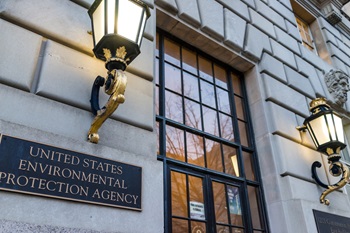By Jennifer Hatcher, Chief Public Policy Officer and SVP, Government Relations, FMI

While the U.S. Congress is on their congressional recess until after Labor Day, the regulatory machinery of government continues to churn out significant and impactful regulations at an incredible pace.
A significant amount of FMI’s government affairs efforts involve advocating on behalf of the industry with regulatory agencies. While these activities admittedly get less attention in the public sphere, they are critically important to ensuring regulations are shaped in a way that do the most good for the industry or the least harm.
Overview of Regulatory Process
Fortunately, there are a number of opportunities for FMI and our member companies to provide input during the regulatory process. While the pathway to developing regulations can be quite complex, generally speaking there are three main phases: the pre-rule information gathering stage, the draft regulation stage, and the final rule stage.
The initial phase includes a Request for Information or an Advanced Notice of Proposed Rulemaking, during which agencies seek information from the public about whether they should pursue issuing a regulation or how they should go about promulgating a proposed rule. FMI often provides feedback to the agency at this point in the process to inform them about whether and how a regulation on a given issue should be developed.
If an agency decides to pursue a regulation, they will issue a draft rule in what’s called a Notice of Proposed Rulemaking. This stage includes a public comment period of usually either 30, 60 or 90 days depending on the scope of the regulation and the time the agency determines is needed for the public to review the rule and provide comments. FMI regularly submits comments at this step in the rulemaking process, developing our comments in consultation with our relevant FMI policy committees.
Once the comment period closes, the agency reviews all of the comments and makes a decision on whether to withdraw the proposed rule, issue a revised proposed rule, or issue a final rule. If they intend to issue a final rule that is estimated to have an annual cost of $200 million or more to the economy, the rule must be reviewed by the White House Office of Management and Budget (OMB) before being published. Sometimes, this review happens earlier in the process during the proposed rulemaking phase. Either way, the regulated community can meet with OMB to raise any concerns. It’s worth noting that OMB has the authority to allow the final rule to proceed as written or to send the rule back to the agency in question for further revisions.
Surge in Regulatory Activity
Given this brief overview of the regulatory process, imagine having to engage numerous agencies across the federal government on dozens of issues at every step in the regulatory process. That’s what FMI does day in and day out. Unfortunately, we’re witnessing a dramatic increase in the number of regulatory actions taken by the government in recent years, with dozens of different regulatory issues impacting the food industry this year alone – everything from labeling requirements, traceability, labor and workforce mandates, environmental issues, competition in the marketplace, privacy and data security, and more.
Meeting with OMB and EPA on HFCs
One recent example of FMI’s regulatory advocacy centers on an Environmental Protection Agency (EPA) final rule that aims to reduce hydrofluorocarbons (HFCs) in commercial refrigeration systems. Specifically, the rule would require a roughly 20-fold decrease in global warming potential (GWP) of these systems by 2025, necessitating extraordinary investments of time and money, not to mention potentially shutting down stores for extended periods or delaying new builds in order to make the upgrades. It’s also unclear whether new systems would be as efficient or effective as refrigeration units already in place - particularly in hot or more extreme climates.
In a demonstration of how important this issue is to the food industry, FMI President and CEO Leslie Sarasin and three other FMI Board members met with representatives from OMB and EPA to discuss their concerns about the proposed rule. They stressed that while the transition to lower GWP systems is important, the industry needs much more than a year and a half to allow the technology to improve, costs to come down, availability of these systems and trained installation personnel to increase, and to have enough time to make the necessary upgrades.
While we remain hopeful that OMB heard our concerns and will take them into consideration as they evaluate the impact of the regulation, we will continue to advocate on the industry’s behalf to ensure both OMB and EPA understand how onerous this regulation would be in its present form.
FMI is so grateful to our members for the operations expertise they provide to allow us to be effective advocates for the industry on this issue and the dozens of others before us.


 Industry Topics address your specific area of expertise with resources, reports, events and more.
Industry Topics address your specific area of expertise with resources, reports, events and more.
 Our Research covers consumer behavior and retail operation benchmarks so you can make informed business decisions.
Our Research covers consumer behavior and retail operation benchmarks so you can make informed business decisions.
 Events and Education including online and in-person help you advance your food retail career.
Events and Education including online and in-person help you advance your food retail career.
 Food Safety training, resources and guidance that help you create a company food safety culture.
Food Safety training, resources and guidance that help you create a company food safety culture.
 Government Affairs work — federal and state — on the latest food industry policy, regulatory and legislative issues.
Government Affairs work — federal and state — on the latest food industry policy, regulatory and legislative issues.
 Get Involved. From industry awards to newsletters and committees, these resources help you take advantage of your membership.
Get Involved. From industry awards to newsletters and committees, these resources help you take advantage of your membership.
 Best practices, guidance documents, infographics, signage and more for the food industry on the COVID-19 pandemic.
Best practices, guidance documents, infographics, signage and more for the food industry on the COVID-19 pandemic.
